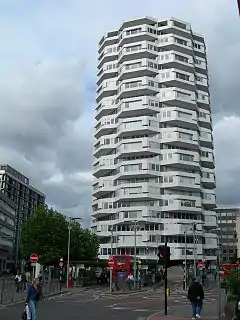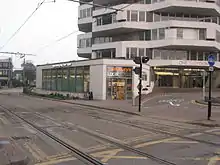No. 1 Croydon
No. 1 Croydon (formerly the NLA Tower, and colloquially the 50p Building, the Weddingcake or the Threepenny bit building)[1] is a tall building at 12–16 Addiscombe Road, Croydon, Greater London, next to East Croydon station. It was designed by Richard Seifert & Partners and completed in 1970. It has 24 storeys and is 269 feet (82 m) high. 'NLA' stood for 'Noble Lowndes Annuities'.[2] It was one of many new buildings constructed in the growing town of Croydon in the 1960s.[3] The development of tall buildings was later encouraged in the 2004 London Plan,[4] which led to the erection of new skyscrapers as Greater London went through a high-rise boom.
| No. 1 Croydon | |
|---|---|
 No. 1 Croydon looking east | |

| |
| Former names | NLA Tower |
| General information | |
| Address | 12-16 Addiscombe Road |
| Town or city | East Croydon, Greater London |
| Country | England |
| Completed | 1970 |
| Design and construction | |
| Architect | Richard Seifert & Partners |
| Structural engineer | Triton |
Restoration project
A refurbishment programme costing over £3.5 million was completed in early 2007. It included a six-month exterior cleaning project, new lobby, landscaping and common areas, and refurbishment of the top ten floors to provide 74,543 square feet (6,925 m2) of high spec, air-conditioned office accommodation.
A substantial amount of work had already been done to improve the façade of the tower. It was identified in a Channel 4 programme as one of the UK's top eyesores. A spokesman for building restoration firm Triton said: "Work is running to schedule and within budget."[5]
Occupiers
No. 1 Croydon is occupied by a number of companies and organisations, including Atkins, Directline holidays, HotGen, dotmailer, Natterbox and Global Resourcing.

In November 2014, a branch of Sainsbury's Local was opened in part of the former courtyard on the north side of the building, effectively forming a part of the structure.[6] The new building attracted criticism on aesthetic grounds and also in respect of safety due to its proximity to the Tramlink track bed.[6]
Other names
No. 1 Croydon was originally known colloquially as the Threepenny Bit Building, due to its resemblance to a number of threepence coins stacked on top of each other. After the coins stopped being used following decimalisation the building eventually gained the alternative nickname the 50p Building, as it also resembles a stack of the now more familiar 50p pieces; and it is also referred to as The Wedding Cake.[7][8] The resemblance to threepenny and 50p coins is approximate, as the building's floors are octagonal (8 sides) whereas threepenny coins were dodecagonal (12 sides) and 50p coins are heptagonal (7 sides).
In popular culture
The building was used as part of an establishing shot in Croydon in the opening credits of the 1980s British sitcom Terry and June.[9] It also appeared in the Black Mirror interactive film, Bandersnatch, as housing the offices of fictional game software developer Tuckersoft.[10]
Listing
The campaign for listing No.1 Croydon is supported by the Twentieth Century Society but this was turned down by English Heritage in 2013.
See also
- Cherry Orchard Road
- East Croydon station
References
- "Croydon, Route & What to See". London Footprints. Retrieved 20 March 2008.
- "Information on names of NLA Tower". Graham Johnson. Retrieved 15 December 2006.
- State of the art refurbishment
- "London - Full Summary of Projects". Will Fox, SkyscraperCity.com. Retrieved 15 December 2006.
- "NLA Tower's makeover nearly done". Croydon Guardian. Retrieved 14 March 2008.
- Croydon Advertiser staff writer (17 December 2014). "East Croydon Sainsbury's: Is this Britain's worst-placed supermarket?". Croydon Advertiser. Retrieved 29 October 2015.
- "Croydon's 50p tower stolen". This is Local London. Retrieved 20 March 2008.
- Your Croydon Pamphlet, February 2009 (Retrieved 4 January 2010)
- https://c20society.org.uk/botm/nla-tower-croydon/
- Debnath, Neela (28 December 2018). "Black Mirror Bandersnatch location: Where is Bandersnatch filmed? Where is it set?". Daily Express. Retrieved 28 December 2018.